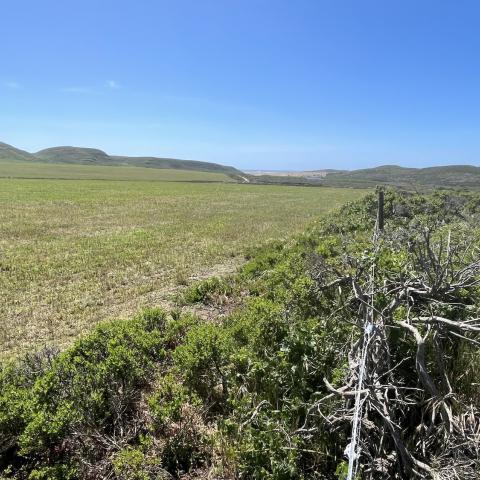
A federal judge has refused to dismiss a lawsuit challenging the continuing operation of cattle ranches in the Pastoral Zone of Point Reyes National Seashore/Karen Klitz
A U.S. District Court has refused to dismiss a lawsuit over the National Park Service's continued allowance of cattle ranching at Point Reyes National Seashore in California, a ruling that could lead the seashore staff to conduct detailed environmental studies on the operations' impacts.
While Park Service attorneys argued that the the agency was not specifically bound by any timetable to generate an updated General Management Plan that examined the propriety of the livestock operations, Judge Saundra Brown Armstrong disagreed.
"This contention lacks merit," she stated in her 13-page ruling handed down last Friday. "The command of the NPS (Organic) Act is clear: 'General management plans for the preservation and use of each System unit . . . shall be prepared and revised in a timely manner by the Director. (Judge's emphasis added). The use of the term 'shall' conveys that the duty to act is mandatory. The imposition of a 'timely manner' requirement, as opposed a specific statutory deadline, does not affect the justiciability of a claim for unreasonable delay under the (Administrative Procedures Act)."
At issue is whether the Park Service has considered the impact that these ranches have on the environment and wildlife at Point Reyes, and whether the proposal to issue new leases without an environmental assessment or environmental impact statement violates the National Environmental Policy Act.
Three groups – the Resource Renewal Institute, Center for Biological Diversity and Western Watersheds Project – filed a lawsuit Feb. 10 in U.S. District Court in San Francisco seeking to require the park to update its General Management Plan and prepare an environmental impact statement before allowing the extension of grazing leases.
They argued that the cattle and dairy operations, comprising more than 18,000 of the park’s 71,000 acres, negatively affect the environment (water quality, methane emissions, erosion, fish habitat), the infrastructure (pavement degradation from milk trucks) and recreational opportunities at Point Reyes. They say the park is relying on an outdated management plan, adopted in 1980, that fails to address current conditions, such as climate change, drought in the area, and an expanding footprint of Tule elk.
While Judge Armstrong did side with the plaintiffs, she also directed them to produce within 21 days a list for the Park Service of "each of the final agency actions they seek to challenge."
"Unsurprisingly, the court agreed that the Park Service must manage our public lands at Point Reyes Natonal Seashore under a current general management plan," Jeff Miller of the Center for Biological Diversity said in a release following the judge's ruling. "We'll proceed with litigation to require an update to the park's badly outdated 1980 plan, and an environmental impact statement, which with public input will determine how the Seashore shoud be managed."
Ranching has been part of the landscape for roughy 150 years. When the national seashore was authorized in 1962, there were about 27 working ranches at Point Reyes, according to Ranching on the Point Reyes Peninsula, a history of dairy and beef ranches released in 1993 by park historian D.S. (Dewey) Livingston. The ranchers signed 25- to 30-year reservations of use and occupancy leases as well as special use permits for cattle grazing. Since then, leases have been renewed on short-term arrangements, generally maxing out at five years, as the family operations have been passed down from generation to generation. Today, 13 ranching families remain in the Pastoral Zone.
In November 2011, when then-Interior Secretary Ken Salazar declined to extend the lease of an oyster farm at the seashore, he directed the Park Service to work on extending ranching leases “from 10 to 20 years to provide greater certainty and clarity for the ranches operating within the national park’s Pastoral Zone and to support the continued presence of sustainable ranching and dairy operations,” according to a release from 2012.
Then, in a memo dated Jan. 31, 2013, Director Jarvis delegated authority to issue leases and permits of up to 20 years, saying the directive is “supportive of multi-generational ranching and dairying within the Pastoral Zone and is consistent with the … provisions of the park’s enabling legislation.”




 Support Essential Coverage of Essential Places
Support Essential Coverage of Essential Places







Add comment